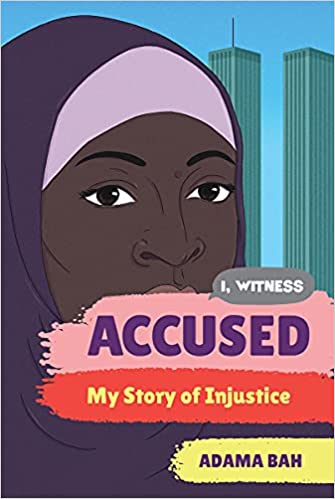Accused
 Accused
Accused
Nonfiction / Young Adult
I, Witness
2021
112

Adama Bah grew up in East Harlem after immigrating from Conakry, Guinea, and was deeply connected to her community and the people who lived there. But as a thirteen-year-old after the events of September 11, 2001, she began experiencing discrimination and dehumanization as prejudice toward Muslim people grew. Then, on March 24, 2005, FBI agents arrested Adama and her father. Falsely accused of being a potential suicide bomber, Adama spent weeks in a detention center being questioned under suspicion of terrorism. With sharp and engaging writing, Adama recounts the events surrounding her arrest and its impact on her life--the harassment, humiliation, and persecution she faced for crimes she didn't commit. Accused brings forward a crucial and unparalleled first-person perspective of American culture post-9/11 and the country's discrimination against Muslim Americans, and heralds the start of a new series of compelling narrative nonfiction by young people, for young people.
Tashnuba “signed you up to be a suicide bomber.” This false accusation led to an FBI investigation, a father’s deportation, and a traumatized teenager. Accused: My Story of Injustice chronicles the falling apart of Adama Bah’s world after the fall of the Twin Towers. Surrounded by her many “cousins”, Adama, a black Muslim girl, felt at home, thought she was at home in New York City until she wasn’t. Informed to her surprise that she was on a list of future suicide bombers, she was taken away, questioned, framed and violated. Deeply personal, Adama’s story nonetheless encapsulates the harassment and violence many Muslim immigrants encountered in the United States after the 9/11 terrorist attacks. The book provides valuable information on islamophobia, racism and crucially centers issues of belonging and not belonging. Brought to the United States from Guinea when she was two, Adama had to be granted asylum to stay. “Still, she writes, the United States is my home. It’s the only place I really know.” What is home? Where is home? Who belongs in this country and who does not? Adama’s narrative raises these very important questions and provides young readers with a way to begin grappling with them.
Awa Sarr. Ph.D.
Michigan State University
Published in Africa Access Review April 21, 2022
Copyright 2022 Africa Access
